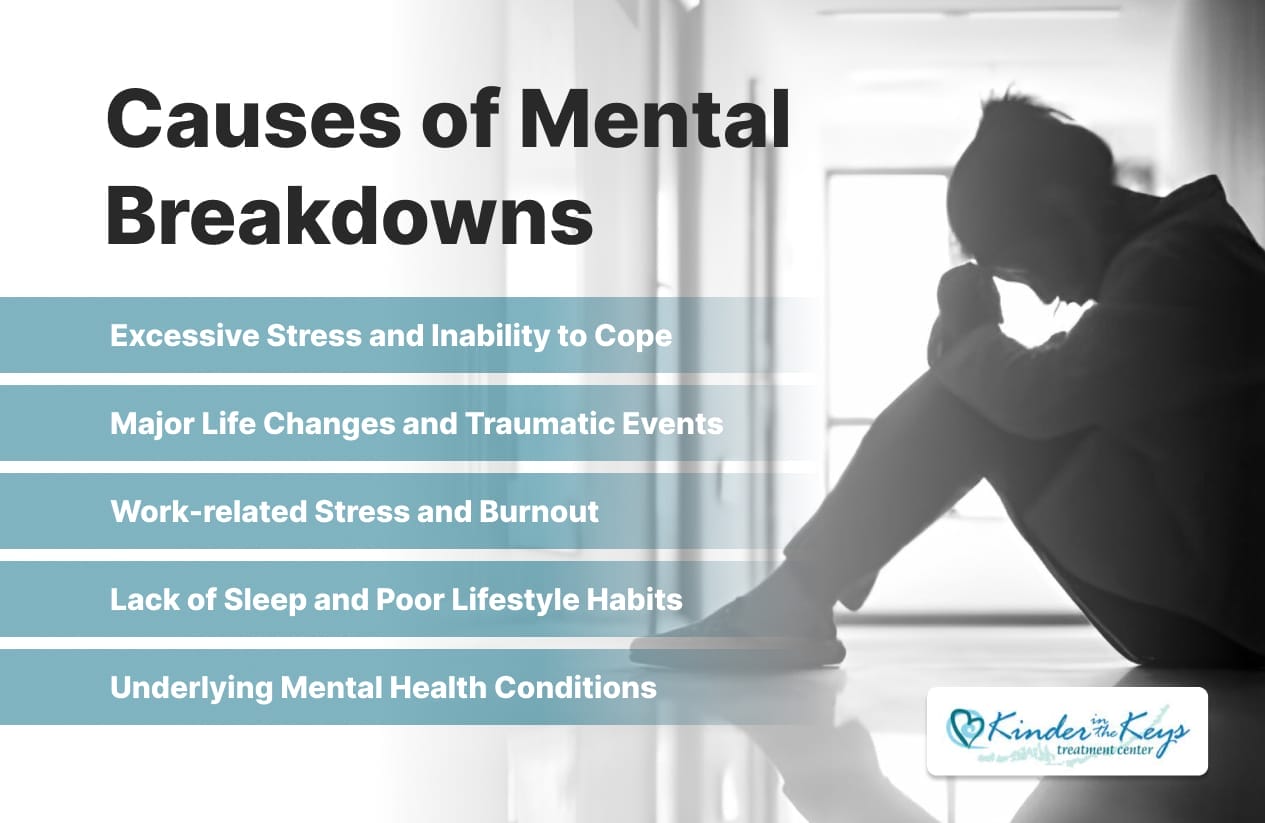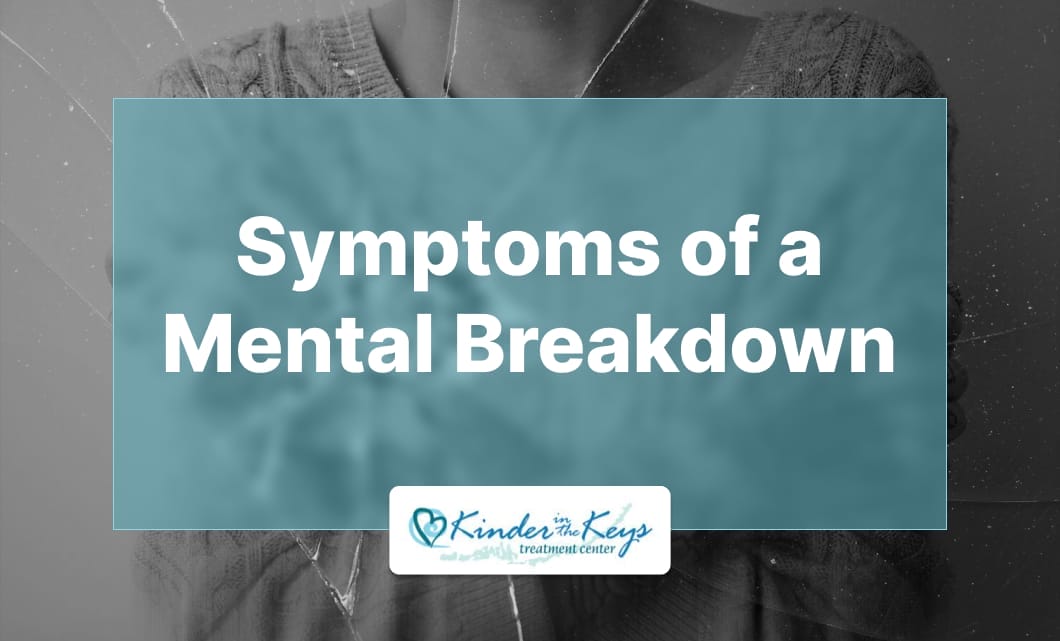Mental breakdowns, often characterized by overwhelming stress and inability to function in daily life, are complex phenomena that can stem from a myriad of causes.
This article aims to shed light on what causes mental breakdowns, identify accompanying symptoms, and understand crucial aspects for anyone facing or witnessing distressing experiences.
As we explore the triggers, symptoms, and support mechanisms, we’ll equip you with the knowledge to navigate these challenging times toward recovery and resilience.

Major Causes of Mental Breakdowns
A mental breakdown, often portrayed in media as a sudden, dramatic crisis, is a period of intense mental distress. During this time, individuals feel profoundly overwhelmed, finding themselves unable to manage their personal and professional lives.
Although the term “mental breakdown” is commonly used, it’s not officially recognized as a clinical diagnosis. If you’re wondering what a mental breakdown really is, it’s important to understand how the term is commonly used to describe periods of intense emotional distress.
In fact, healthcare professionals do not use “mental breakdown” to label a specific mental health disorder. Rather, it signifies instances where an individual grapples with severe stress, anxiety, or depression symptoms, causing a noticeable halt in their everyday activities.
Several factors contribute to the onset of a mental breakdown. Understanding these can help identify and mitigate risks before they escalate into more severe conditions.
Excessive Stress and Inability to Cope
When life’s demands tower over our perceived capacity to handle them, we find ourselves in excessive stress. This imbalance triggers a chronic activation of our “fight or flight” response, a state not meant for the long haul.
Over time, being in constant high alert drains our physical and emotional reserves, leading to exhaustion and, if not addressed, a mental breakdown. The science behind this reveals that prolonged exposure to cortisol and other stress hormones can wreak havoc on nearly every system in our body.
This hormonal siege increases the risk of a laundry list of health issues, including but not limited to anxiety, depression, digestive troubles, heart disease, insomnia, weight fluctuations, and impairments in memory and concentration.
Major Life Changes and Traumatic Events
Life’s significant shifts and traumas shake the very foundations of our stability and predictability—cornerstones of psychological health.
The stress from adapting to a significant change or rebounding from a trauma can swamp our coping strategies, especially if these events stack up or hit with severe impact.
Trauma can rewire the brain’s emotion and memory circuits, escalating stress reactions to life changes or reminders of the event, overburdening our ability to cope, and potentially leading to a breakdown.
Work-related Stress and Burnout
Chronic workplace stress, fueled by overwhelming workloads, pressing deadlines, limited control over work, and insufficient organizational support, can spiral into burnout. Burnout manifests through exhaustion, cynicism or detachment from the job, and a dwindling sense of professional efficacy.
This condition doesn’t just undermine mental and physical health; it wears down resilience, making everyday stressors increasingly difficult to navigate and heightening the risk of a mental breakdown.
Lack of Sleep and Poor Lifestyle Habits
Skimping on sleep and engaging in unhealthy lifestyle choices form a vicious cycle of stress, each exacerbating the other. Sleeplessness undermines cognitive functions, emotional balance, and physical health, all essential for managing stress adeptly.
This often leads to a greater dependency on unhealthy coping tactics, such as poor nutrition, sedentary habits, and substance abuse, which in turn feed into the stress cycle and heighten the risk of a mental breakdown. Sleep is fundamental for memory solidification, emotional processing, and bodily repair—pillars of mental well-being.
Underlying Mental Health Conditions
Anxiety and depression magnify the body’s stress responses, making even routine stressors appear overwhelming. These conditions can tweak brain chemistry, altering how stress hormones are managed.
For those battling these conditions, everyday challenges can provoke stress reactions, overwhelming their coping capacities and paving the way for a breakdown. The relationship between stress and mental health disorders is intricate, with each potentially intensifying the other, creating a feedback loop that can spiral into a mental breakdown.

Symptoms of a Mental Breakdown
Recognizing the symptoms of a nervous breakdown is crucial for seeking timely help and support.
These symptoms can vary widely among individuals but typically encompass a range of psychological, physical, and behavioral signs indicating acute distress.
Psychological Symptoms
The psychological toll of a mental breakdown can manifest through a variety of deeply affecting symptoms:
- Anxiety: This can appear as overwhelming worry and fear, often disproportionate to the situation at hand. Panic attacks featuring intense fear and physical symptoms like heart palpitations and dizziness may also occur, heightening the sense of alarm.
- Depression: Marked by profound sadness, a lack of interest in enjoyable activities, and feelings of hopelessness, depression during a mental breakdown can make the world seem colorless and joyless. Thoughts of self-harm or suicide are severe symptoms that require immediate attention.
- Cognitive Challenges: Stress can cloud one’s ability to think clearly, leading to difficulty with concentrating, decision-making, and memory. This cognitive fog can transform everyday decisions into overwhelming hurdles.
Physical Symptoms
Physical symptoms often mirror the inner turmoil, manifesting in various ways:
- Fatigue: A common physical reaction that’s an all-consuming tiredness that rest doesn’t seem to alleviate, making even small tasks feel insurmountable.
- Sleep Disturbances: Whether it’s struggling to fall asleep or sleeping too much, disrupted sleep patterns further compound stress, creating a relentless cycle that’s hard to break.
- Changes in Appetite: Stress can lead to decreased appetite or an inclination to overeat, both of which can significantly impact physical health and well-being.
- Unexplained Physical Pain: Headaches, muscle tension, and stomach issues without a clear medical cause can be the body’s response to sustained psychological stress.
Behavioral Changes
Changes in behavior often serve as the most noticeable indicators of a mental breakdown:
- Withdrawal: Pulling back from social engagements and responsibilities is a sign that interactions have become overwhelmingly stressful.
- Performance Drop: A noticeable decline in work or academic performance can arise as concentration and motivation falter under stress.
- Mood Swings and Irritability: Emotional volatility, including irritability and anger, often reflects the frustration and turmoil of dealing with continuous stress.
- Substance Use: Turning to alcohol, drugs, or other substances for relief can offer a temporary escape but risks leading to dependency and complicating recovery.

Seeking Help and Treatment Options
Each option offers unique benefits and can be tailored to meet individual needs and preferences.
Professional Support
Talking with mental health experts, such as therapists or psychiatrists, is a critical step in addressing mental health challenges. These professionals can provide a comprehensive care package that includes diagnosis, personalized therapy sessions, and medication management if necessary. Their expertise allows for a nuanced understanding of each individual’s mental health, ensuring that the treatment plan is as effective as possible.
Seeking professional support offers a safe space to explore underlying issues and work towards healing in a structured and supportive environment.
Therapy
Cognitive-behavioral therapy (CBT) and other therapeutic techniques are instrumental in addressing the root causes of mental distress.
Therapy offers a structured approach to understanding and managing emotions, behaviors, and thoughts that contribute to mental health issues. By developing healthier coping strategies, individuals can learn to navigate life’s challenges more effectively. Therapy sessions provide a supportive environment to explore personal issues and develop practical skills for dealing with stress, anxiety, depression, and other mental health concerns.
Medication
In some cases, medication is an essential component of a comprehensive treatment plan. Medications can help manage symptoms of underlying mental health conditions, such as anxiety or depression, making it easier to engage in therapy and other treatment modalities.
Psychiatrists can prescribe and manage medications, ensuring they are used safely and effectively. While medication can be incredibly beneficial, it is often most effective when combined with therapy and lifestyle changes.
Lifestyle Modifications
Adopting a healthy lifestyle plays a significant role in improving mental health and resilience.
Balanced nutrition, regular physical activity, and sufficient sleep are foundational elements that support overall well-being.
Making lifestyle changes can help reduce stress, improve mood, and enhance energy levels, contributing to a stronger mental state. Simple changes, such as incorporating more whole foods into the diet, establishing a regular exercise routine, and prioritizing sleep, can profoundly affect mental health.
Stress-Relief Practices
Incorporating stress-relief practices into your daily life is an effective way to manage stress and improve emotional regulation. Mindfulness, meditation, and deep breathing exercises are accessible tools that can help calm the mind, reduce anxiety, and enhance focus.
These practices can be integrated into daily routines, offering a practical approach to stress management. By regularly engaging in stress-relief activities, individuals can develop a more resilient and responsive approach to handling life’s pressures.
Moving Beyond Mental Breakdowns
It’s crucial to remember that understanding these causes not only demystifies the experience of a mental breakdown but also empowers us to seek the help and support necessary for healing.
Taking action—whether it’s reaching out to a professional, adopting healthier lifestyle habits, or simply starting a conversation about mental health—can make a significant difference in preventing and managing mental breakdowns.
Your mental health is invaluable, and with the right tools and support, recovery is within reach.
